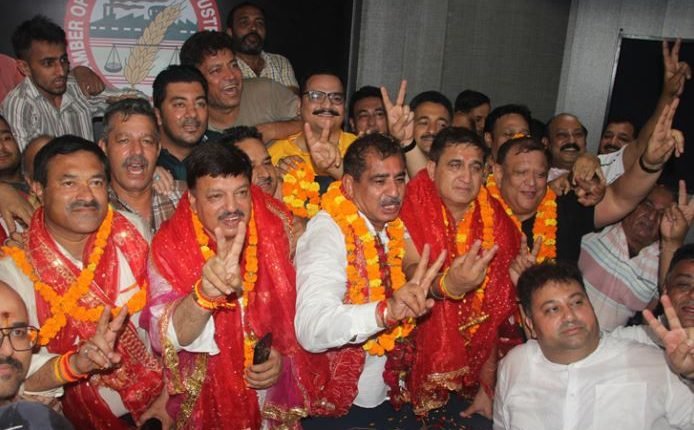Business leadership and democratic engagement are often viewed as distinct spheres—one driven by economic imperatives and the other by civic values. Yet, the recent 2025–27 biennial elections of the Chamber of Commerce & Industry (CCI) Jammu have underscored just how deeply intertwined these realms are in shaping the future of a region’s economic and social fabric. Held under the vigilant supervision of the election committee led by Shiv Partap Gupta, the polls witnessed a spirited contest, marked by remarkable voter turnout and competitive participation across all key posts. This democratic exercise has not only resulted in the selection of a new leadership team but also highlighted the community’s desire for accountable, visionary, and representative stewardship at the helm of Jammu’s leading business institution.
Arun Gupta’s re-election as president, with 1461 votes over Rakesh Gupta’s 1290, signals a mandate of continuity blended with expectations of reinvigoration. Voters appear to have placed their trust in Gupta’s experience while also demanding a responsive agenda that adapts to the challenges and aspirations of today’s commerce-driven society. Equally telling were the decisive margins in other posts, such as Anil Gupta’s victory as Senior Vice President and Rajeev Gupta (Kaka)’s overwhelming win for Junior Vice President, which collectively reflect the electorate’s preference for clarity, commitment, and a sense of unity within the organization’s ranks. The election of Manish Gupta as Secretary General, Rajesh Gupta (Rinku) as Secretary, and Rajesh Gupta (Raju) as Treasurer further adds a dynamic blend of expertise and grassroots connection to the team, offering an opportunity to bridge generational and strategic gaps. What distinguishes this electoral moment is not merely the tally of votes, but the quiet assertion of democratic values in a space often perceived as transactional and power-centric. Business chambers play an influential role in shaping local economies, representing traders’ interests, and acting as critical interlocutors between government policies and public sentiment. When such institutions engage in fair, transparent, and inclusive electoral processes, they send a powerful message about the importance of representation, accountability, and collective vision. The CCI Jammu election serves as a living example of how democracy, when practiced with purpose, can elevate the integrity and legitimacy of leadership within civil society. Yet, beyond the electoral mechanics and celebratory outcomes lies a more serious question: what now? Jammu’s commercial sector stands at a complex intersection of legacy challenges and emerging opportunities. The prolonged disruptions in regional tourism, the struggle of small businesses in post-pandemic recovery, and the rising cost of compliance for local traders all demand a renewed strategic framework. The new leadership will have to walk a tightrope between advocacy and action, balancing the immediate needs of the business community with the longer-term imperatives of sustainable growth, infrastructural development, and inclusive innovation. The expectation is not just to manage but to lead—to set benchmarks, inspire confidence, and make the CCI a proactive partner in Jammu’s transformation. Moreover, the new executive team will need to confront internal reforms. An institution that commands the voice of thousands must also embrace modernization in its administrative functioning, communication strategies, and outreach mechanisms. In an era defined by digital transitions and stakeholder-centric governance, the CCI can no longer afford to be perceived as a closed club. It must reflect the diversity, energy, and ambition of Jammu’s emerging entrepreneurs—whether they are running traditional family-run stores, scaling up startups, or reviving post-COVID ventures. It is also time for the Chamber to reimagine its role as a policy influencer and community anchor. A city’s commercial body is not merely an economic organ but also a custodian of civic order, urban aesthetics, and public welfare. By engaging more robustly with youth, civil society groups, academic institutions, and environmental advocates, the Chamber can amplify its relevance and broaden its impact. This new term, therefore, must not only deliver routine representations and administrative resolutions but also redefine what it means to be a truly participatory business institution in a transforming Jammu.
The 2025–27 CCI elections have laid the groundwork for such a renewal. Now, it is up to the elected leadership to prove that democracy in commerce is not just about casting votes, but about casting vision, building consensus, and leading with conscience. The people of Jammu—its business community and beyond—will be watching, and more importantly, hoping.




